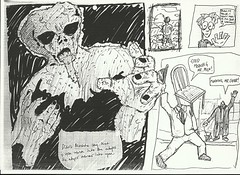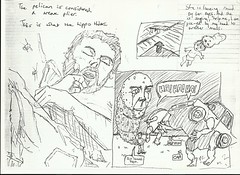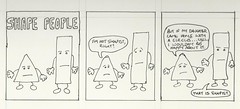There used to be a time, not too long ago, when psychedelic drugs were a subject of fascination among intellectuals. This of course was before they became adopted by the sixties counterculture and swiftly demonized and legislated against. It’s no secret that I have a soft spot for the sixties counterculture and the psychedelic philosophies of people like Leary and Wilson. However, in our rose-tinted nostalgic fascination with the sixties the earlier intellectual interest in these drugs is often forgotten. This is not to say that thinkers such as Leary and Wilson weren’t intellectuals, in fact I would argue that they are two of the great philosophers of the 20th Century. They were just a little early. What I mean to say is that prior to that movement there was a time when people who were effectively buttoned-up were experimenting with these drugs. There was a time when the media reported on psychedelics with a measured and fascinated tone. There was a time when discussing the psychedelic experience was inches away from being an acceptable activity.
It was in 1954, a decade before the Summer of Love, or the Beatles White Album, or Ken Kesey and his Merry Pranksters, that the author Aldous Huxley declared in The Doors of Perception that:
To be shaken out of the ruts of ordinary perception, to be shown for a few timeless hours the outer and the inner world, not as they appear to an animal obsessed with survival or to a human being obsessed with words and notions, but as they are apprehended, directly and unconditionally, by Mind at Large—this is an experience of inestimable value to everyone and especially to the intellectual.
Now this is not only beautifully written but it is also a world away from sixties sloganeering “Turn On, Tune in, and Drop Out” (valuable as that advice might also be). The notion that such an experience might be of “inestimable value to everyone and especially to the intellectual” seems downright radical in the modern era which is sadly lacking intellectuals willing or able to articulate the value of the psychedelic experience never mind arguing for its adoption on a wide scale (bar a few notable exceptions we will address later on). If Huxley’s book introduced the psychedelic experience to a serious, literary audience a widely read 1957 article in Life magazine published by the ‘New York banker’ Gordon Wasson entitled Seeking the Magic Mushroom (available here) introduced it to a wide popular readership. As Wikipedia points out, this article had repercussions far beyond the edification and entertainment of the general audience it was intended for:
In 1957, R. Gordon Wasson, the vice president of J.P.Morgan, published an article in Life extolling the virtues of magic mushrooms.This prompted Albert Hofmann to isolate psilocybin in 1958 for distribution by Sandoz alongside LSD in the U.S., further raising interest in LSD in the mass media. Following Wasson’s report, Timothy Leary visited Mexico to experience the mushrooms.
To get an even clearer idea of how psychedelic drugs were an intellectual-dare we even say ‘middle class’- object of fascination in the fifties there is no more convincing (and retrospectively amusing) evidence than the video below from 1955 of Conservative (!!!) MP Christopher Mayhew under the influence of 400 mgs of mescaline for BBC’s Panorama. For anyone wanting to follow this up this version of the clip is taken from the longer BBC documentary Hoffman’s Potion, which can be watched here.





